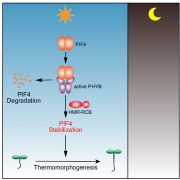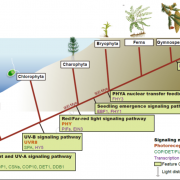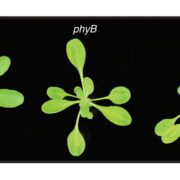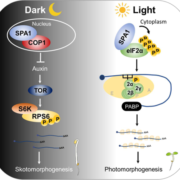Chloroplast status can affect shade avoidance in plants ($) (Plant Cell)
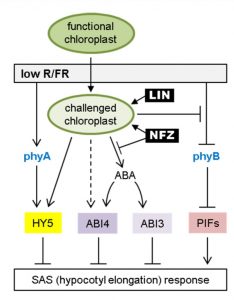 For optimal photosynthetic performance, plants utilize multiple strategies to compete with their neighbors. Especially when light supply is limited in the canopy, plants promote their own elongation to overgrow neighboring plants. This occurs as a response to a low ratio of Red to Far-Red light (R/FR), in a process called the Shade Avoidance Syndrome (SAS). Recently Ortiz-Alcaide et al. revealed the essential role of chloroplast function in SAS, without which the stem of Arabidopsis cannot elongate in canopy shade. More importantly, they found that low R/FR may trigger a feedback mechanism in SAS via inhibiting phyB deactivation, increasing HY5 accumulation and promoting ABA signaling to prevent excessive elongation. This is an elegant study of the interaction between light and retrograde pathway that shows that chloroplasts are far more than a photosynthesis platform, but are also important for light sensing and signaling. (Summary by Nanxunq Qin). Plant Cell 10.1105/tpc.18.00617
For optimal photosynthetic performance, plants utilize multiple strategies to compete with their neighbors. Especially when light supply is limited in the canopy, plants promote their own elongation to overgrow neighboring plants. This occurs as a response to a low ratio of Red to Far-Red light (R/FR), in a process called the Shade Avoidance Syndrome (SAS). Recently Ortiz-Alcaide et al. revealed the essential role of chloroplast function in SAS, without which the stem of Arabidopsis cannot elongate in canopy shade. More importantly, they found that low R/FR may trigger a feedback mechanism in SAS via inhibiting phyB deactivation, increasing HY5 accumulation and promoting ABA signaling to prevent excessive elongation. This is an elegant study of the interaction between light and retrograde pathway that shows that chloroplasts are far more than a photosynthesis platform, but are also important for light sensing and signaling. (Summary by Nanxunq Qin). Plant Cell 10.1105/tpc.18.00617


